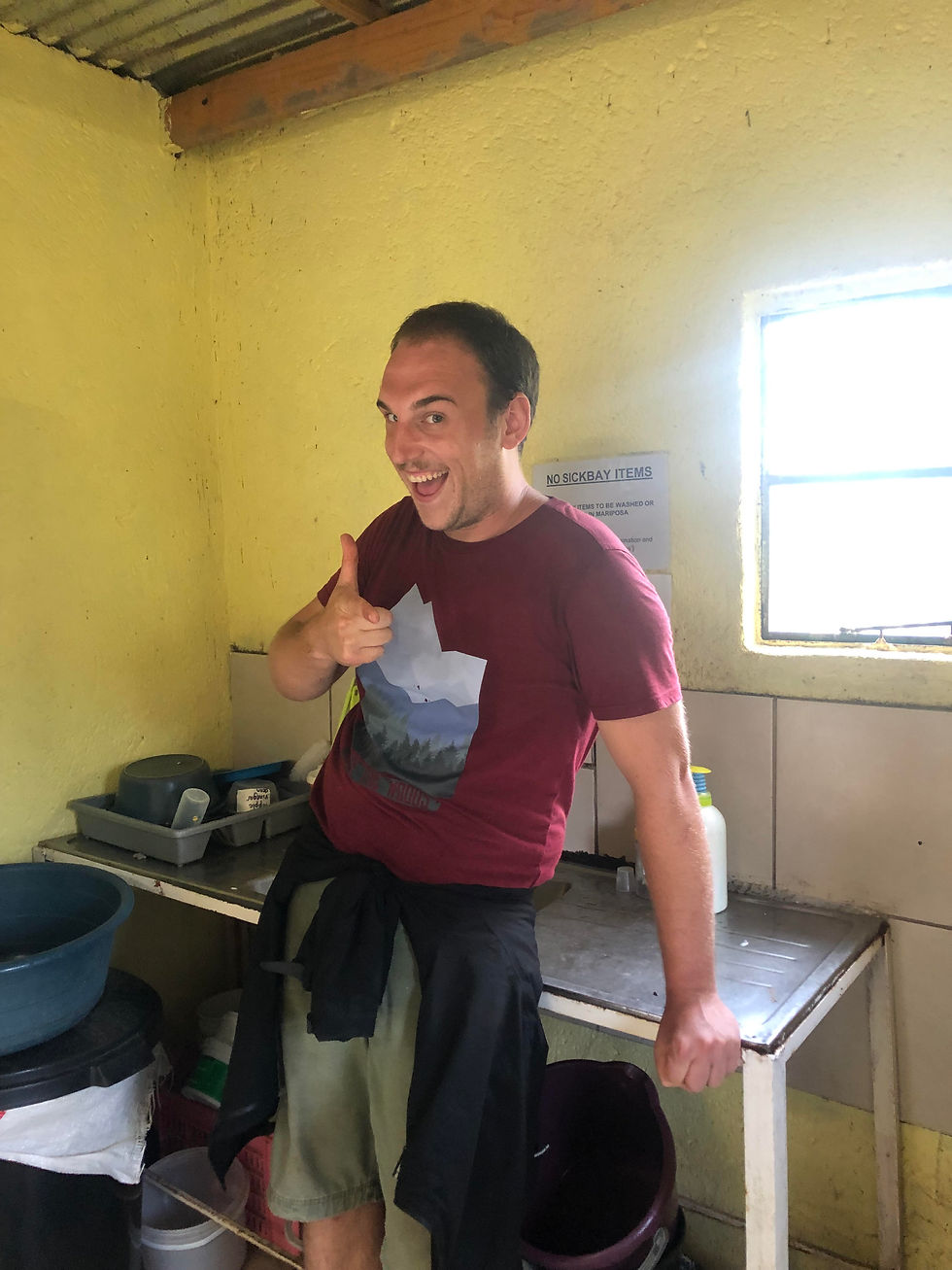We have also been volunteering at the Vervet Monkey Foundation, VMF about one day a week while we've been here...so about 6 times total. Like Care for Wild, VMF takes in orphaned and injured animals and nurses them back to health. As the name implies, VMF specializes in vervet monkeys rather than rhinos. Most of the animals they take in are orphans. They come from farms where the monkeys are seen as pests (farmers will kill the adult monkeys but can't seem to kill the cute babies), monkeys whose moms were hit by cars or other accidents and monkeys kept as pets that people later realize should not be kept as pets. They also get older injured monkeys and former pets.
They have a unique program that they have developed to try to get these new arrivals integrated into the "wild" troops that they have on their reserve. For the babies, that means bottle feeding them for a couple of weeks (with tiny 60ml bottles rather than the 2L Coke bottles used for the rhinos) then introducing them to foster mom monkeys who take over from there and bring the babies into the troops.
It is very hard to release a monkey back into the wild -- they would have to be sure to find the exact troop that the monkey came from and be sure that they would accept the monkey back into the troop on the fly. This does happen once in a while and is very gratifying for the entire staff. There was one monkey nursed back to health in sick bay and returned to her troop a month or two later while we've been here. They knew where she had been injured so, once she was healthy, they went back with her to that site and waited. From what we later heard - the first troop that came by wasn't hers...they showed know recognition of each other. But when a second troop showed up, the monkeys started calling to each other, and the staff watched as the now healthy monkey went off with her troop. So that does happen, but not too often. However, the troops that live at VMF are about as wild as can be. They live in large, wooded enclosures and have limited contact with people. New monkeys are slowing introduced to their new troops in "integration enclosures" that sit on the side of a troop's larger enclosed area so the monkeys become familiar with each other through a fence first, and ultimately the doors open and the monkeys find their new families. Some monkeys can never be integrated with a new troop due to their earlier circumstances or personality, but most are. VMF's ultimate goal is to find and purchase a huge plot of forest somewhere where they can safely release entire troops of monkeys from their smaller enclosure areas.
We've done a variety of jobs from filling water bowls in the enclosures to cooking a vegan spooky Halloween feast for the staff and volunteers (they are all vegan there) to finding "treats" for the monkeys (like special seed pods or grasses that they don't often get inside the enclosures) around the grounds and making them into "enrichment" packets to stimulate them and give them something new and exciting to figure out - we wrapped fruit, leaves and seeds in larger leaves and secured them with a thorn - kind of like a lettuce wrap! Then we handed them out and watched as the monkeys figured out how to open their "presents" and picked out what treasures they wanted to eat from inside.
Like Care for Wild, VMF asks visitors to restrict pictures they post. This is so people don't think keeping a monkey as a pet is a good idea (rather than to protect them from poachers as with the rhinos). Vervet monkeys are not endangered but, as with most animal species, they are being squeezed from habitat loss so are being forced into more contact with people. So we need to be sure not to post any pictures that show people taking care or handling monkeys -- people can take that to think that it is ok to have a monkey as a pet. But it is not. They are wild animals and do not take well to being pets.
Baby monkeys are sooooo cute, though. It is easy to see why people would want to keep them as pets. Part of our volunteer time was spent caring for the orphan babies -- it is spring, the season for monkey babies to be born -- and so far there are 7 babies that they have received (last year they got 40 babies throughout the season). Just like any babies, they sleep a lot but then they spend the rest of their time climbing around, jumping, pouncing and, well, being monkeys. The first babies that they received are already just about set to be introduced to the foster moms so they will not get used to being handled by people and can have a normal monkey life.
At both VMF and Care For Wild, we have been tremendously impressed with the staff and volunteers. The staff is (mostly) young people who are clearly very dedicated and love the animals. They have a tough job to do -- not just working with the animals but with the rotating crew of volunteers that come through who need to be instructed in what to do. Their patience, kindness, empathy, pride and care has been universal and impressive. We continue to feel that young people will save the world that we older generations have broken. It's a hopeful feeling.

We had some fun Halloween night during our dinner cooking shift with a few other volunteers and Aaron making "poison mushrooms", "Frankenstein's brains", "haunted garden entrails (gluten and soy free!)", "jack-o-lantern squash", "mummy sausages" (vegan), spooky truffles for dessert. With costume party with games after. Lots of fun.


























Comments